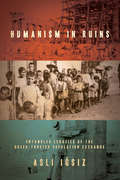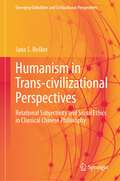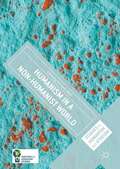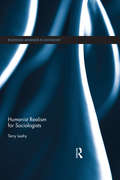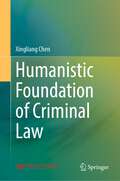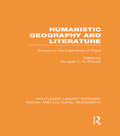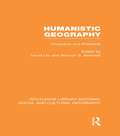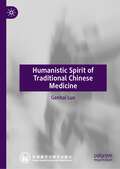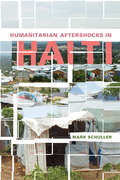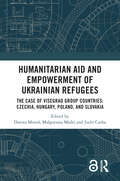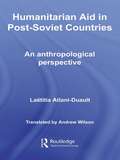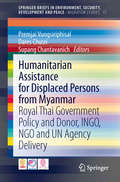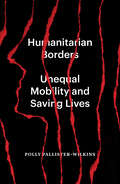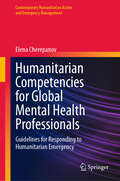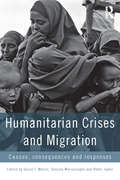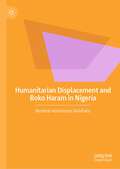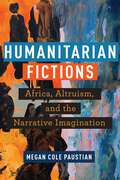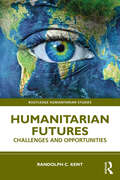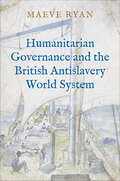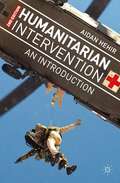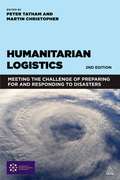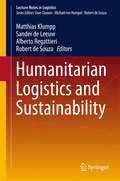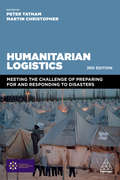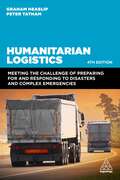- Table View
- List View
Humanism in Ruins: Entangled Legacies of the Greek-Turkish Population Exchange
by Aslı IğsızThe 1923 Greek-Turkish population exchange forcibly relocated one and a half million people: Muslims in Greece were resettled in Turkey, and Greek Orthodox Christians in Turkey were moved to Greece. This landmark event set a legal precedent for population management on the basis of religious or ethnic difference. Similar segregative policies—such as creating walls, partitions, and apartheids—have followed in its wake. Strikingly, the exchange was purportedly enacted as a means to achieve peace. Humanism in Ruins maps the links between liberal discourses on peace and the legacies of this forced migration. Aslı Iğsız weaves together past and present, making visible the effects in Turkey across the ensuing century, of the 1923 exchange. Liberal humanism has responded to segregative policies by calling for coexistence and the acceptance of cultural diversity. Yet, as Iğsız makes clear, liberal humanism itself, with its ahistorical emphasis on a shared humanity, fails to confront an underlying racialized logic. This far-reaching and multilayered cultural history investigates what it means to be human—historically, socially, and politically. It delivers an urgent message about the politics of difference at a time when the reincarnation of fascism in different parts of the world invites citizens to participate in perpetuating a racialized and unequal world.
Humanism in Trans-civilizational Perspectives: Relational Subjectivity and Social Ethics in Classical Chinese Philosophy (Emerging Globalities and Civilizational Perspectives)
by Jana S. RoškerThis book introduces into the current global ethics debate models of humanism developed in classical Chinese traditions, which have not yet been comprehensively presented to Western scholarship or integrated into the framework of global discourses on social ethics and morality. It creates new paradigms for an understanding of humanism that meets the demands of our time. It begins by presenting European descriptions and critical assessments of this discourse, and then moves to an exploration of humanistic ideas shaped through historical developments in Asia, with a focus on the Chinese tradition. In this sense, the book is written from a transcivilizational perspective. The methods used in the research transcend---that is, surpass and overcome---the rigid, isolating, and essentialist concept of civilization. At the same time, the book points to the possibility of transformation through the exchange of knowledge and ideas between different civilizations. Within this framework, the book starts from the assumption that the ontology of civilizations and cultures is not based on immutable substances, but on the relations between different factors that constitute them as categories. The transcivilizational perspective rooted in transcultural dialogues between philosophies that originated in different cultures and civilizations is particularly valuable because of the globalized world in which we live today. This means that the problems that affect people in different parts of the world and the issues that are embedded in different geopolitical and developmental frameworks also affect all of humanity. This book is of particular interest to scholars and students of global ethics, globalization, Asian philosophy and Sinology.
Humanism in a Non-Humanist World (Studies in Humanism and Atheism)
by Monica R. MillerThis book brings together a diverse and wide-ranging group of thinkers to forge unsuspecting conversations across the humanist and non-humanist divide. How should humanism relate to a non-humanist world? What distinguishes “humanism” from the “non-humanist?” Readers will encounter a wide-range of perspectives on the terms bringing together this volume, where “Humanism” “Non-Humanist” and “World” are not taken for granted, but instead, tackled from a wide variety of perspectives, spaces, discourses, and approaches. This volume offers both a pragmatic and scholarly account of these terms and worldviews allowing for multiple points of analytical and practical points of entry into the unfolding dialogue between humanism and the non-humanist world. In this way, this volume is attentive to both theoretically and historically grounded inquiry and applied practical application.
Humanist Realism for Sociologists (Routledge Advances in Sociology)
by Terry LeahyRecent critiques treat humanism as a mistaken value framework. Indeed, the concept of human nature is in fact essential for sociology, but is often being denied at the same time as it appears without acknowledgement. While classic authors can show us how to connect an ethics with a concept of human nature, current humanists must tackle the sociobiological view of human nature and interrogate humanism in the light of the ecological crisis. Humanist Realism for Sociologists both explains and explores some of the main arguments surrounding humanism put forward by classic social theorists such as Aristotle, Marx and Weber, as well as more contemporary authors, such as Braidotti, Oakley, Weedon, Firestone, Connell, Flyvjberg, Foucault and Bourdieu. A must-have tool for understanding how value perspectives cannot be eliminated from the social sciences, this book is essential for undergraduates, postgraduates and postdoctoral researchers interested in the fields of sociology, anthropology, women’s studies, social work, human geography, political philosophy and ecology.
Humanistic Foundation of Criminal Law
by Xingliang ChenThis book uses humanity-rationality and experience and the freedom of human will as a theoretical perspective to examine the basic framework of criminal law theories constructed by the criminal classic school and the criminal empirical school. The author puts forward the principle of the duality of rationality and experience of humanity and affirms the determinism of human behavior in the ontological sense and the freedom of will in the axiological sense. From this point of view, this book examines the humanistic foundations of crime and punishment, legislation and justice.
Humanistic Geography and Literature: Essays on the Experience of Place (Routledge Library Editions: Social and Cultural Geography)
by Douglas C. D. PocockThis book introduces the beginning student to the major concepts, materials and tools of the discipline of geography. While it presents geographic theory, as whole and for each of its parts, the chief emphasis is on concrete analysis and example rather than on abstraction, an approach which has proven more successful for undergraduate courses than those with a more heavily theoretical bias. The text was extensively re-written for the third edition, which enhanced its clarity and effectiveness, with expanded cartographic coverage.
Humanistic Geography: Problems and Prospects (Routledge Library Editions: Social and Cultural Geography)
by David Ley Marwyn S. SamuelsHumanistic geography now has an established position in the intellectual development of contemporary geography. However there has so far been little attempt to draw together the humanistic approach in one broad statement. This book by the leading figures in the field provides a platform for the exposition of humanistic geography in all its aspects.
Humanistic Spirit of Traditional Chinese Medicine
by Genhai LuoThis book aims to introduce in everyday language the profound culture and unique legacy of the ancient healing art with mesmerizing stories, allusions and anecdotes in the history of its evolution, handpicked from three perspectives, including contributions of master TCM practitioners, the nourishment of TCM by traditional Chinese culture, and the exchanges between TCM and its western counterparts. The vivid narrative of each section is complemented with elaboration of one related key TCM concept in a specific column. It is a brilliant reader for those interested in TCM and traditional Chinese culture.
Humanitarian Aftershocks in Haiti
by Mark SchullerThe 2010 earthquake in Haiti was one of the deadliest disasters in modern history, sparking an international aid response--with pledges and donations of $16 billion--that was exceedingly generous. But now, five years later, that generous aid has clearly failed. In Humanitarian Aftershocks in Haiti, anthropologist Mark Schuller captures the voices of those involved in the earthquake aid response, and they paint a sharp, unflattering view of the humanitarian enterprise. Schuller led an independent study of eight displaced-persons camps in Haiti, compiling more than 150 interviews ranging from Haitian front-line workers and camp directors to foreign humanitarians and many displaced Haitian people. The result is an insightful account of why the multi-billion-dollar aid response not only did little to help but also did much harm, triggering a range of unintended consequences, rupturing Haitian social and cultural institutions, and actually increasing violence, especially against women. The book shows how Haitian people were removed from any real decision-making, replaced by a top-down, NGO-dominated system of humanitarian aid, led by an army of often young, inexperienced foreign workers. Ignorant of Haitian culture, these aid workers unwittingly enacted policies that triggered a range of negative results. Haitian interviewees also note that the NGOs "planted the flag," and often tended to "just do something," always with an eye to the "photo op" (in no small part due to the competition over funding). Worse yet, they blindly supported the eviction of displaced people from the camps, forcing earthquake victims to relocate in vast shantytowns that were hotbeds of violence. Humanitarian Aftershocks in Haiti concludes with suggestions to help improve humanitarian aid in the future, perhaps most notably, that aid workers listen to--and respect the culture of--the victims of catastrophe.
Humanitarian Aid and Empowerment of Ukrainian Refugees: The Case of Visegrad Group countries: Czechia, Hungary, Poland, and Slovakia
by Dorota Moroń, Małgorzata Madej and Judit CsobaThe book presents good practices in humanitarian assistance and empowerment of Ukrainian refugees in various areas: emergency aid to large groups crossing the border, organisation of support in places of temporary stay, learning local languages, inclusion of children in school and adults in the labour market, and inclusion in the local community. It indicates the forms of international protection and the scope of their application by migrants from Ukraine, and discusses the temporary protection status dedicated to Ukrainian refugees.The volume will be of great interest to scholars and researchers of migration and diaspora studies, immigration law, and public policy.
Humanitarian Aid in Post-Soviet Countries: An Anthropological Perspective (Central Asian Studies)
by Laetitia Atlani-DuaultAn anthropologist among aid workers. Her objective: to study that exotic tribe, humanitarian and development workers, along with their state and non-state partners, as they "export democracy" to post-soviet countries of Central Asia and the Caucasus. Her method: to join the tribe for ten years. From New York to Alma-Ata, by way of Geneva and Baku, Laëtitia Atlani-Duault provides both an understanding of the individuals working in the field and a critical analysis of the sweeping political implications of NGO activities. A focus on supposedly "de-politicized" policy areas (notably the prevention of HIV/AIDS epidemic) provides wider insights into the objectives and practices of international aid workers in countries beset by rising poverty, drug trafficking, prostitution, and decaying education and health services. The author also provides a rich canvas of human stories, from the "workshops" in which diametrically opposed political approaches often clash to the occasional small triumphs in which effective public health interventions are worked out. This timely book will be of great interest not only to scholars of post-soviet countries, but also to those interested in humanitarian and development aid worldwide. It will also be relevant for the study of the anthropology of development, as well as medical and political anthropology.
Humanitarian Assistance for Displaced Persons from Myanmar
by Supang Chantavanich Premjai Vungsiriphisal Dares ChusriThis book is one of four volumes on a major empirical migration study by leading Thai migration specialists from Chulalongkorn University (Bangkok) for the United Nations Development Programme (UNDP). This volume examines the protracted refugee situation at the Thai-Myanmar border. Displaced persons are kept in closed settlements, and this has limited their self-reliance. A resettlement program has been implemented and many refugees have been accepted in resettlement countries. Repatriation is not recommended as a durable solution unless Myanmar becomes a safe place for return. Funding and intervention policies of international organizations and NGOs vary. Donors prefer to switch humanitarian assistance to development aid. The book provides realistic policy recommendations for a durable solution for refugees at the borders. Practitioners and policymakers from governments, international organizations and NGOs will benefit from its findings. The volume is also helpful for anyone studying forced migration and its denouement in the globalized age.
Humanitarian Borders: Unequal Mobility and Saving Lives
by Polly Pallister-WilkinsThe seamy underside of humanitarianismWhat does it mean when humanitarianism is the response to death, injury and suffering at the border? This book interrogates the politics of humanitarian responses to border violence and unequal mobility, arguing that such responses mask underlying injustices, depoliticise violent borders and bolster liberal and paternalist approaches to suffering. Focusing on the diversity of actors involved in humanitarian assistance alongside the times and spaces of action, the book draws a direct line between privileges of movement and global inequalities of race, class, gender and disability rooted in colonial histories and white supremacy and humanitarian efforts that save lives while entrenching such inequalities. Based on eight years of research with border police, European Union officials, professional humanitarians, and grassroots activists in Europe&’s borderlands, including Italy and Greece, the book argues that this kind of saving lives builds, expands and deepens already restrictive borders and exclusive and exceptional identities through what the book calls humanitarian borderwork.
Humanitarian Competencies for Global Mental Health Professionals: Guidelines for Responding to Humanitarian Emergency (Contemporary Humanitarian Action and Emergency Management)
by Elena CherepanovThis book provides a comprehensive guidance for mental health professionals to humanitarianism and humanitarian culture. When responding to disasters, wars, famines, political violence and other humanitarian emergencies, mental health providers join other multidisciplinary and multisectoral humanitarian actors coming from around the world and united by a common purpose of saving lives and eliminating suffering. This book orients globally minded mental health and human services providers to the professional and personal challenges they can face and equips them with core humanitarian competencies: the understanding of the context of humanitarian work, the knowledge of relief systems, and best practices. Familiarity with the guidelines and regulations is essential for establishing effective collaborations and conducting contextually appropriate and ethical interventions, avoiding duplication of services, minimizing fragmentation, and reducing risks for all involved. The recognition of tremendous differential power and the extreme vulnerability of people served call for the highest standards and integrity of conduct and practice as the price for an ethical indiscretion in a humanitarian emergency can be very high. Humanitarian competencies mitigate risks associated with aid work in the increasingly polarized and politicized world. This mentally and morally demanding environment emphasizes the importance of peer support, self-awareness and self-care to manage fantasies and prevent burnout. The book is written by a global mental health expert with over 20 years of experience responding to international humanitarian emergencies and teaching theory and practice of global mental health in academic settings. In this volume, Dr. Elena Cherepanov combines empirical evidence with academic rigor to share unique insights and original observations with mental health professionals interested in learning the nuts and bolts of humanitarian action. The author also reviews ethically questionable practices, emerging myths and misconceptions in global mental health work and suggests protocols for negotiating ethical and moral dilemmas in the humanitarian situation.
Humanitarian Crises and Migration: Causes, Consequences and Responses
by Susan F. Martin, Sanjula Weerasinghe and Abbie TaylorWhether it is the stranding of tens of thousands of migrant workers at the Libyan–Tunisian border, or the large-scale displacement triggered by floods in Pakistan and Colombia, hardly a week goes by in which humanitarian crises have not precipitated human movement. While some people move internally, others internationally, some temporarily and others permanently, there are also those who become "trapped" in place, unable to move to greater safety. Responses to these "crisis migrations" are varied and inadequate. Only a fraction of "crisis migrants" are protected by existing international, regional or national law. Even where law exists, practice does not necessarily guarantee safety and security for those who are forced to move or remain trapped. Improvements are desperately needed to ensure more consistent and effective responses. This timely book brings together leading experts from multi-disciplinary backgrounds to reflect on diverse humanitarian crises and to shed light on a series of exploratory questions: In what ways do people move in the face of crisis situations? Why do some people move, while others do not? Where do people move? When do people move, and for how long? What are the challenges and opportunities in providing protection to crisis migrants? How might we formulate appropriate responses and sustainable solutions, and upon what factors should these depend? This volume is divided into four parts, with an introductory section outlining the parameters of "crisis migration," conceptualizing the term and evaluating its utility. This section also explores the legal, policy and institutional architecture upon which current responses are based. Part II presents a diverse set of case studies, from the earthquake in Haiti and the widespread violence in Mexico, to the ongoing exodus from Somalia, and environmental degradation in Alaska and the Carteret Islands, among others. Part III focuses on populations that may be at particular risk, including non-citizens, migrants at sea, those displaced to urban areas, and trapped populations. The concluding section maps the global governance of crisis migration and highlights gaps in current provisions for crisis-related movement across multiple levels. This valuable book brings together previously diffuse research and policy issues under the analytical umbrella of "crisis migration." It lays the foundations for assessing and addressing real challenges to the status quo, and will be of interest to scholars, policy makers, and practitioners committed to seeking out improved responses and ensuring the dignity and safety of millions who move in the context of humanitarian crises.
Humanitarian Displacement and Boko Haram in Nigeria
by Medinat Abdulazeez MalefakisThe book analyses the management of the internal displacement caused by activities of Boko Haram’s terrorist insurgence in Nigeria. With over 3.1m persons displaced, the humanitarian crisis is at teeter ends with acute malnourishment, inadequate wash and non-relief materials, improper hygiene facilities, and lack of access to basic relief aid for displaced persons. The array of humanitarian organisations belies the concrete living conditions of displaced persons and calls to question the huge resources assumed to be expended on managing the humanitarian crisis in the northeast of Nigeria and the Lake Chad Basin in general. Based on ethnographic research in IDP camps, the book chronicles the concrete living conditions of displaced persons and argues that IDPs in Northeastern Nigeria have been victimised first by Boko Haram’s terrorism, and then victimised again by inefficient, un-coordinated, and unsuitable displacement management programs. This book also explicate the roles played by the Nigerian government and international aid agencies in managing this displacement, vis-à-vis a comparative analysis of similar, but better managed displacement situations in Kenya, Lebanon, and Turkey.
Humanitarian Fictions: Africa, Altruism, and the Narrative Imagination
by Megan Cole PaustianHumanitarianism has a narrative problem. Far too often, aid to Africa is envisioned through a tale of Western heroes saving African sufferers. While labeling white savior narratives has become a familiar gesture, it doesn’t tell us much about the story as story. Humanitarian Fictions aims to understand the workings of humanitarian literature, as they engage with and critique narratives of Africa.Overlapping with but distinct from human rights, humanitarianism centers on a relationship of assistance, focusing less on rights than on needs, less on legal frameworks than moral ones, less on the problem than on the nonstate solution. Tracing the white savior narrative back to religious missionaries of the nineteenth century, Humanitarian Fictions reveals the influence of religious thought on seemingly secular institutions and uncovers a spiritual, collectivist streak in the discourse of humanity. Because the humanitarian model of care transcends the boundaries of the state, and its networks touch much of the globe, Humanitarian Fictions redraws the boundaries of literary classification based on a shared problem space rather than a shared national space. The book maps a transnational vein of Anglophone literature about Africa that features missionaries, humanitarians, and their so-called beneficiaries. Putting humanitarian thought in conversation with postcolonial critique, this book brings together African, British, and U.S. writers typically read within separate traditions. Paustian shows how the novel—with its profound sensitivity to narrative—can enrich the critique of white saviorism while also imagining alternatives that give African agency its due.
Humanitarian Futures: Challenges and Opportunities (Routledge Humanitarian Studies)
by Randolph C. KentHumanitarian Futures: Challenges and Opportunities explores the increasing types, dimensions and dynamics of crises threatening the world in the twenty-first century, and argues that those with humanitarian roles and responsibilities can only meet such challenges if their approaches to strategic and operational planning undergo fundamental paradigmatic shifts. Strategically and operationally, such shifts must begin by planning from the future, for the future.Author Randolph C. Kent, the UN’s first Humanitarian Coordinator, with experience in some of the most complex crises of modern times, including Rwanda, Ethiopia, Kosovo, Sudan and Somalia, provides a blueprint for dealing with ever greater complexity on planet Earth and beyond. That blueprint is not about upgrading existing tools or relying upon tried precedence. Rather, it points to a new paradigm for meeting crises. It begins by looking at the changing nature of humanness and governance, and then turns to plausible future crises based on such changes, before concluding with practical steps for dealing with ever more complex humanitarian threats, now and in the future.This book will be an essential read for humanitarian policymakers and practitioners as well as for humanitarian and global studies researchers and students who are and want to be engaged in understanding and preparing for ever more complex and unpredictable humanitarian challenges.
Humanitarian Governance and the British Antislavery World System
by Maeve RyanHow the suppression of the slave trade and the &“disposal&” of liberated Africans shaped the emergence of modern humanitarianism Between 1808 and 1867, the British navy&’s Atlantic squadrons seized nearly two thousand slave ships, &“re‑capturing&” almost two hundred thousand enslaved people and resettling them as liberated Africans across sites from Sierra Leone and Cape Colony to the West Indies, Brazil, Cuba, and beyond. In this wide-ranging study, Maeve Ryan explores the set of imperial experiments that took shape as British authorities sought to order and instrumentalise the liberated Africans, and examines the dual discourses of compassion and control that evolved around a people expected to repay the debt of their salvation. Ryan traces the ideas that shaped &“disposal&” policies towards liberated Africans, and the forms of resistance and accommodation that characterized their responses. This book demonstrates the impact of interventionist experiments on the lives of the liberated people, on the evolution of a British antislavery &“world system,&” and on the emergence of modern understandings of refuge, asylum, and humanitarian governance.
Humanitarian Intervention: An Introduction 2nd edition
by Aidan HehirA broad-ranging introduction to the theory, practice and politics of humanitarian intervention in the contemporary world. This second edition has been fully updated and includes a new chapter on Libya and the Arab Spring.
Humanitarian Logistics
by Martin Christopher Peter TathamHumanitarian Logistics examines the key challenges facing those whose role it is to organize and distribute resources in the most difficult of situations. This multi-contributor title includes insights from some of the world's leading experts in humanitarian logistics. It examines key issues including, warehousing, procurement and funding.With particular focus on pre-disaster preparation, rather than post-disaster assistance, Humanitarian Logistics provides current thinking as well as best practice for those who need to understand the many challenges and ways to respond effectively in this crucial area.
Humanitarian Logistics and Sustainability
by Matthias Klumpp Sander Leeuw Alberto Regattieri Robert SouzaThis contributed volume combines conceptual and strategic research articles dealing with the "why" and "to what end" of sustainable operations in humanitarian logistics, as well as operational research contributions regarding the "how" from the United Nations as well as from researchers and organizations from different countries (Germany, Australia, Singapore, Netherlands, Italy, Denmark, Jordan). The target audience primarily comprises research experts, decision makers and practitioners in the field, but the book may also be beneficial for graduate students.
Humanitarian Logistics: Meeting the Challenge of Preparing For and Responding To Disasters
by Martin Christopher Peter TathamEffective logistics play a critical role in disaster preparation and response, but how can those working in this field deliver in environments which are often dangerous and unstable? Humanitarian Logistics provides thought-provoking guidance and discussion of the core issues facing practitioners involved in managing the logistics of disaster relief. With insights from academics and practitioners who have worked in these situations, this multi-contributed book offers suggestions for best practice and international perspectives on the nature of the humanitarian logistics challenge. Now in its third edition, Humanitarian Logistics is fully updated and contains new chapters on providing support for complex emergencies, waste management and reverse logistics, the application of value stream analysis and the potential of new technologies such as 3D printing, cash transfer programmes and drones. With a particular focus on pre-disaster preparation and inter-agency cooperation, this book is essential reading for anyone who needs to understand how to respond effectively during a disaster or crisis. Includes online resources for lecturers and students.
Humanitarian Logistics: Meeting the Challenge of Preparing for and Responding to Disasters and Complex Emergencies
by Peter Tatham Professor Graham HeaslipIn rapidly developing emergencies, it is vital for aid agencies to understand how to establish an agile supply chain that resists the chaos of a crisis and can cater to unknown needs. Now in its fourth edition, Humanitarian Logistics presents chapters from a wide range of academics and practitioners and offers cutting edge research into how complex problems such as distribution of the COVID-19 vaccine and provision of relief to victims of natural disasters can be solved. New chapters cover topics such as cash-based humanitarian logistics (HL) systems, sustainability in a HL context and providing logistics services for humanitarian relief.In recent years, a number of global crises have highlighted the critical role that logistics plays in humanitarian response. There is a vital need to understand how to conduct operations in confused and swiftly changing environments. This book is essential reading for anyone who needs to understand how to effectively manage supply networks during a rapidly developing emergency.
Humanitarian Photography
by Davide Rodogno Heide FehrenbachFor well over a century, humanitarians and their organizations have used photographic imagery and the latest media technologies to raise public awareness and funds to alleviate human suffering. This volume examines the historical evolution of what we today call "humanitarian photography" - the mobilization of photography in the service of humanitarian initiatives across state boundaries - and asks how we can account for the shift from the fitful and debated use of photography for humanitarian purposes in the late nineteenth century to our current situation in which photographers market themselves as "humanitarian photographers." This book is the first to investigate how humanitarian photography emerged and how it operated in diverse political, institutional, and social contexts, bringing together more than a dozen scholars working on the history of humanitarianism, international organizations and nongovernmental organizations, and visual culture in Africa, Asia, the Middle East, Europe, and the United States. Based on original archival research and informed by current historical and theoretical approaches, the chapters explore the history of the mobilization of images and emotions in the globalization of humanitarian agendas up to the present.
